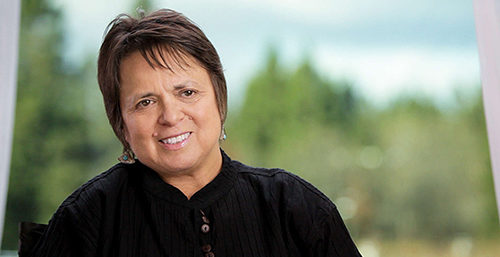Thursday, May 2, 7pm
Mission Room at The Hook & Ladder Theater
3010 Minnehaha Ave, Minneapolis
FREE and open to the public!
Click Here to download a PDF poster for this event
RSVP here to be entered in our prize raffle!
From the celebrated editor of This Bridge Called My Back, Cherríe Moraga charts her own coming-of-age in her new memoir.
 Native Country of the Heart is, at its core, a mother-daughter story. The mother, Elvira, was hired out as a child by her own father to pick cotton in California’s Imperial Valley. The daughter, Cherríe, is a brilliant, pioneering, queer Xicana feminist. The story of these two women, and of their people, is woven together in an intimate memoir of critical reflection and deep personal revelation. As Moraga charts her mother’s journey—from impressionable young girl to battle-tested matriarch to old woman—she traces her own self-discovery of her gender-queer body and Lesbian identity, as well as her passion for activism. As her mother’s memory fails, Moraga is driven to unearth forgotten remnants of a U.S. Mexican diaspora, its indigenous origins, and an American story of cultural loss. Poetically wrought and filled with insight into intergenerational trauma, Native Country of the Heart is a reckoning with white American history and a piercing love letter from a fearless daughter to the mother she will never lose.
Native Country of the Heart is, at its core, a mother-daughter story. The mother, Elvira, was hired out as a child by her own father to pick cotton in California’s Imperial Valley. The daughter, Cherríe, is a brilliant, pioneering, queer Xicana feminist. The story of these two women, and of their people, is woven together in an intimate memoir of critical reflection and deep personal revelation. As Moraga charts her mother’s journey—from impressionable young girl to battle-tested matriarch to old woman—she traces her own self-discovery of her gender-queer body and Lesbian identity, as well as her passion for activism. As her mother’s memory fails, Moraga is driven to unearth forgotten remnants of a U.S. Mexican diaspora, its indigenous origins, and an American story of cultural loss. Poetically wrought and filled with insight into intergenerational trauma, Native Country of the Heart is a reckoning with white American history and a piercing love letter from a fearless daughter to the mother she will never lose.
Listen to a new interview with Cherríe Moraga on the NPR program "Latino USA."
 At this special Twin Cities event, Moraga will be in conversation with local author Alexis Pauline Gumbs. Self described as a “queer black troublemaker,” Gumbs is a writer, scholar, and activist who currently teaches at the University of Minnesota. This conversation is not to be missed!
At this special Twin Cities event, Moraga will be in conversation with local author Alexis Pauline Gumbs. Self described as a “queer black troublemaker,” Gumbs is a writer, scholar, and activist who currently teaches at the University of Minnesota. This conversation is not to be missed!
“I love Native Country of the Heart’s forthright blending of a bio of Moraga’s intriguing powerhouse mom, Elvira, with Moraga’s own queer evolution. And that the intimate facts of Cherríe Moraga’s family history get embedded alongside such valuable public secrets as the mass deportation of Mexican workers during the depression so that dust bowl farmers could have their jobs. This book is a coup.”
—Eileen Myles, author of Afterglow“A beautiful, painful, funny, heartening and heartfelt immersion in the life of one of the leading voices of Latino/a literature, our very own Cherríe Moraga. Part elegy, part history and part testimonio rife with storytelling, Native Country of the Heart, like all of Moraga’s work, charts the unmapped and unspoken territories of body, mind, heart and soul and refuses to be confined by any border or genre…. in this moving and brave book she gives us all a reckoning our country needs now.”
—Julia Alvarez, author of In the Time of the Butterflies“This is a great book. In telling her mother’s life-story Cherríe Moraga ruthlessly examines her own heart and the deep complications of growing up mixed race and lesbian in a racist culture. But she also lays bare the spiritual core that strengthens and sustains her. The heart, the soul, familia and tribe, the native country is as narrow as the space between clenched fingers and as wide as the sightlines to the horizon.”
—Dorothy Allison, author of Bastard Out of Carolina
ABOUT THE AUTHOR
Cherríe Moraga is a writer and cultural activist whose work serves to disrupt the dominant narratives of gender, race, sexuality, feminism, indigeneity, and literature in the United States. A co-founder of Kitchen Table: Women of Color Press, Moraga co-edited the highly influential volume This Bridge Called My Back: Writings by Radical Women of Color in 1981. After twenty years as an Artist-in-Residence in Theater at Stanford University, Moraga was appointed a professor in the Department of English at the University of California, Santa Barbara in 2018, where, with her artistic partner Celia Herrera Rodríguez, she instituted Las Maestras Center for Xicana Indigenous Thought and Art Practice. She is the recipient of a National Endowment for the Arts Theatre Playwriting Fellowship Award and a United States Artist Rockefeller Fellowship for Literature.

